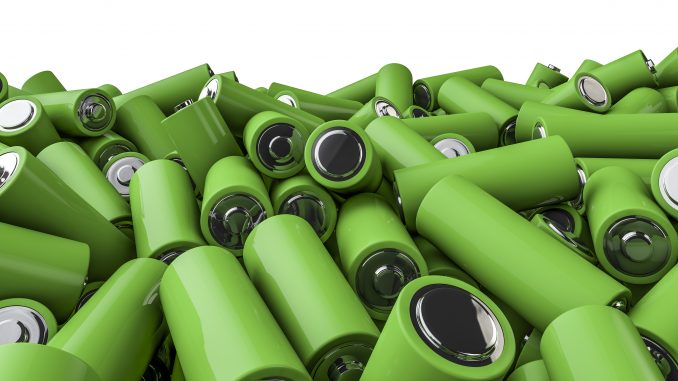
A set of new reports forecasting battery demand in Scotland over the next 25 years has uncovered a ‘golden circular opportunity’ to bring economic advantage and more green jobs to the country as part of its net-zero Transition.
The research, commissioned by Zero Waste Scotland, in partnership with Transport Scotland and Scottish Enterprise, forecasts that used batteries will triple over the next 25 years as demand grows across all sectors, potentially reaching over 60,000 tonnes per year in Scotland by 2045.
It highlights the potential for reprocessing batteries in Scotland using the nation’s green energy grid to reduce carbon emissions and create “significant new job opportunities.” The reports, entitled ‘Battery use in Scotland now and in the future’, add to previous evidence that most used batteries – and the valuable and potentially hazardous materials they contain – are currently exported for recycling or sent to landfill.
By assessing the expected rising demand for batteries across key sectors, including transport, the agency found that around 40 percent of future battery waste could come from electric vehicles, while high levels of consumption for technological goods like smart phones over the past decade will also be a source of battery waste. Minister for Green Skills,
Circular Economy and Biodiversity Lorna Slater said: “As we transition to a low carbon economy, batteries will play an increasingly important and welcome role in our transport and energy sectors.
“This valuable research from Zero Waste Scotland, commissioned by Scottish Enterprise and Transport Scotland, identifies the opportunities that current modern lithium battery technology can bring – including the potential to support a Just Transition and create new jobs in areas such as refining, repurposing and recycling.
“Even with zero emission technology, we cannot meet our world leading climate targets without a more circular economy here in Scotland. Conserving valuable and finite resources in a way which supports jobs, communities and our environment is a sensible approach we can all get behind.”
Iain Gulland, Chief Executive, Zero Waste Scotland, said: “This report sees us map out a potential resource and revenue stream for Scotland’s future. It is one of a number of resource mapping reports Zero Waste Scotland plans to produce to ensure we are armed with the knowledge we need to capitalise on the economic opportunities of sustainable resource management in a Net-zero future.
“In forecasting the future demand for batteries, we can identify a golden opportunity to develop a circular approach to the way we manage those batteries when they become waste. Embracing these opportunities is fundamental to our achievement of Net-zero for Scotland.”
Charlotte Stamper, circular economy energy infrastructure specialist at Zero Waste Scotland, said: “The switch from fossil fuels to greener, electric vehicles is an important step in helping to end the climate crisis. Batteries can help make that happen. But as this study highlights, we need to build in a sustainable way to reuse and recycle those batteries at the end of their first life. Investing in these circular solutions now is better for the planet and creates more green jobs, stronger supply chains, greater resilience to trade disruption and reduced costs.”
Andy McDonald head of low carbon transition at Scottish Enterprise said: “This series of reports into the future of batteries with Transport Scotland and Zero Waste Scotland looks at the sector, EV batteries and future technology to identify opportunities for Scottish companies to improve sustainability and increase circularity within the supply and disposal chain.
“Scottish Enterprise is committed to delivering economic growth for Scotland that creates a sustainable, inclusive and fair future for us all. We have a key role in supporting businesses as well as developing opportunities around new technology and markets. There is huge opportunity in the fast-growing demand for new, innovative battery technology supporting our energy use and increased use of electric transport. As these reports highlight, there is also significant additional resource, revenue and jobs potential from battery remanufacturing and we will utilise the findings and link to wider work around energy transition that will be key to reaching Scotland’s net zero targets.”
Key recommendations in the research included:
- Updating the existing Extended Producer Responsibility scheme for batteries giving manufacturers a greater duty to minimise waste and associated emissions;
- Introducing battery recycling targets and carbon footprint declarations to discourage waste;
- Designing new batteries with end of life in mind so they are easy to disassemble for re-use.
The reports were commissioned through a valuable new interagency collaboration to accelerate decarbonisation of national transport and energy by making best use of resources through the circular economy. The Faraday Institution has estimated that growing demand for batteries from the switch to electric vehicles could boost jobs in the automotive industry and battery supply chain UK-wide from 186,000 to 246,000 by 2040.
Notes For Editors
A briefing paper on the research is available here. To read the full reports visit Zero Waste Scotland’s website, here. The single greatest cause of the climate crisis in Scotland is all the goods, materials and services we produce, consume and discard, too often after just one use. Switching to the circular economy will help make things last by first reducing, reusing, repairing, remaking and finally recycling. About Zero Waste Scotland: Zero Waste Scotland exists to lead Scotland to use products and resources responsibly, focusing on where we can have the greatest impact on climate change. Using evidence and insight, our goal is to inform policy, and motivate individuals and businesses to embrace the environmental, economic, and social benefits of a circular economy. We are a not-for-profit environmental organisation, funded by the Scottish Government and European Regional Development Fund. More information on all Zero Waste Scotland’s programmes can be found at https://www.zerowastescotland.org.uk/. You can also keep up to date with the latest from Zero Waste Scotland via our social media channels – Twitter | Facebook | LinkedIn For media enquiries contact: Sophie Thirkell (Communications Consultant – PR and Media) Email: sophie.thirkell@zerowastescotland.org.uk Mobile: 07966 284095
Source: https://www.zerowastescotland.org.uk/press-release/harnessing-full-potential-battery-power-will-unlock-huge-opportunities-part-net-zero
